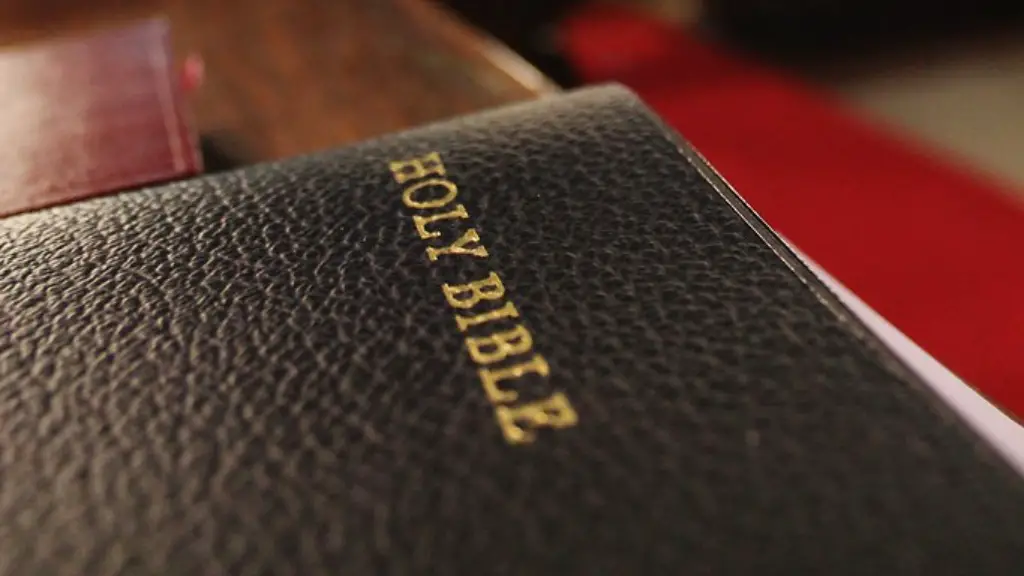There are a few different ways to quote the Bible in an essay. The most common way is to use parentheses () and include the chapter and verse. For example, if you were quoting John 3:16, you would write: “For God so loved the world, that he gave his only Son, that whoever believes in him should not perish but have eternal life” (John 3:16). If you wanted to quote a specific part of the verse, you would put the section you wanted to quote in quotation marks “”. For example, you could write: “For God so loved the world, that he gave his only Son” (John 3:16).
If you are quoting a longer section of the Bible, you can use a block quote. To do this, start the quote on a new line and indent the whole passage ½ inch (1.2 cm) from the left margin. For example:
The Lord is my shepherd, I lack nothing.
He makes me lie down in green pastures,
he leads me beside quiet waters,
he refreshes my soul.
He guides me along the right paths
for his name’s sake.
Even though I walk
through the darkest valley,
I
When quoting the Bible in an essay, be sure to include the name of the book, chapter, and verse(s) you are referencing. For example: “In John 3:16, it says, ‘For God so loved the world that he gave his one and only Son…’”
How do you directly quote the Bible?
When citing a passage of scripture, it is important to include the abbreviated name of the book, the chapter number, and the verse number. This will ensure that the reader can easily find the passage in question. Chapter and verse should be separated by a colon, and multiple verses should be separated by a dash. For example: 1 Cor 13:4, 15:12-19.
The Bible is a collection of religious texts that are central to Christianity. There are many different versions of the Bible, but all of them are considered to be sacred texts by Christians. When referencing the Bible in your paper, you should always italicize the name of the book, and include the specific edition you are using in your parenthetical citation.
Do you italicize the Bible in an essay
The Bible is a sacred text for Christians, and the Authorized King James Version is a popular translation. Oxford University Press published this edition in 1998. In general, references to scriptural works like the Bible, Talmud, and Koran should not be italicized unless you are referring to a specific published edition.
To cite the Bible in APA Style, use the general book citation format, omitting the author element and listing the specific version used as the title. Include a URL if you accessed an online version.
For example:
The Bible. (n.d.). Retrieved from https://www.biblegateway.com/
Can I quote the Bible in my essay?
The first time you reference a version of the Bible, in the in-text citations, give the name of the edition (italicized), followed by a comma and the abbreviated book (see back of handout), chapter, and verse. Use a period, not a colon, between the chapter and verse: John 316.
The King James Version of the Bible is in the public domain, which means that there are no copyright restrictions and permission is not needed to quote it. This is a great resource for anyone looking to study the Bible or use it for reference.
How do you quote a religious text in MLA?
MLA referencing is a system for crediting sources used in academic writing. When you use someone else’s ideas or information in your paper, you must give credit to the source. MLA style uses brief parenthetical citations in the text to point readers to the full citation in the Works Cited list.
In MLA style, the first in-text citation of a religious text should specify the version you’re using, as well as the chapter, book and verse (or another standard division where applicable). For example:
Allah is noted for being “swift in account” (The Holy Qur’an, Ghafir 4017).
Biblically based texts require a different type of citation than other sources. When you are citing a specific passage, you will need to include the book, chapter, and verse (BCV). For example, Mark 12:30 reads, “And you shall love the Lord your God with all your heart and with all your soul and with all your mind and with all your strength.”
You would cite this as (Mark 12:30). If you are referencing the Bible as a whole, you would just include the version you are using. For example, The Holy Bible, New International Version.
When you are citing the Bible in MLA format, you will need to include it in your Works Cited list as well. The format for this is:
The Bible. Version. Date of Publication.
How do you cite a religious text in MLA
This is a citation for the Bible, specifically the New Jerusalem Bible. The editor is Henry Wansbrough and it was published by Doubleday in 1985.
When writing about sacred texts, it is important to capitalize the names of the texts. However, you should not italicize the name (as you would with a book title). The adjectives derived from names of sacred texts should also be lowercased.
How do you cite the King James Bible in MLA?
The Bible: Authorized King James Version. This is the official Bible of the Anglican Church and was published in 1611.
When writing about a religious text, one should not italicize the text itself. However, if writing about a specific edition of the text, one may need to italicize it. This is because writers and scholars sometimes need to distinguish between the religious text as a monolith and an individual publication as an edition.
How do you cite a Bible paraphrase
When referencing the Bible for the first time, it is important to include which version of the Bible you used as well as the publication date for both the original and republished versions. You do not need to include the version name in subsequent references. If you are citing the Bible in your reference list, use the following format: Bible (version), (year).
There is no one right way to format books and versions of the Bible. Some people may prefer to underline or italicize them, while others may put them in “quotes.” Ultimately, it is up to the individual to decide how they want to format their own personal copy of the Bible.
How do you verbally quote a Bible verse?
When quoting scripture, it is important to keep a few principles in mind in order to ensure that you are accurately conveying the intended meaning. First, always mention the context in which the quote is found. This will give your audience crucial information that will help them to understand what the quote is saying. Second, remember that all quotes by their very nature omit something. This is why it is so important to be clear about what you are trying to communicate with your audience. Choose the words that make the best sense standing alone, and make sure that your audience understands what you are trying to say.
When citing a verse from the Bible, it is standard to include the book name, chapter number, and verse number. Sometimes the name of the Bible translation is also included. There are several different formats for doing this.
How do you in-text cite a religious text
If you are citing a chapter or verse from the Bible, you should use canonical numbering rather than page numbers. For example, in the King James Bible, the person vowed to “set me as a seal upon thine heart” (Song of Solomon 8:6).
When referring to a generic religious text in your paper, do not italicize or use quotation marks. These terms appear without italics or quotation marks when referred to in your paper: Bible, Old Testament, Genesis, Gospels, Talmud, Qur’an (Koran), Upanishads.
Warp Up
The Bible is a sacred text for Christians, and quoting from it can be a powerful way to strengthen your argument in an essay. To quote the Bible correctly, you must use a reliable translation and be familiar with the original language it was written in. When quoting from the Bible, you should include the book, chapter, and verse you are referencing. For example, you might write “As the Bible says in John 3:16, ‘For God so loved the world that he gave his one and only Son, that whoever believes in him shall not perish but have eternal life.'”
The Bible is a religioustext that can be quoted in an essay to support your argument or point. When quoting the Bible, you must reference the specific book, chapter, and verse. For example, “And Jesus said unto them, I am the bread of life: he that cometh to me shall never hunger; and he that believeth on me shall never thirst” (John 6:35).





